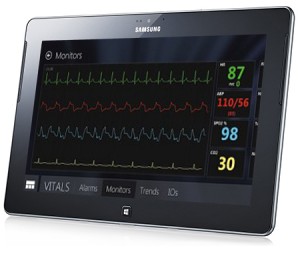 Mobile patient monitoring company AirStrip has partnered with Samsung to make its AirStrip One mobility software available on Samsung tablets, which run Android and Windows 8.1 operating systems. Adding a native Android tablet completes the operating system trifecta for the company, which has long worked with Apple and announced a partnership with Microsoft in July.
Mobile patient monitoring company AirStrip has partnered with Samsung to make its AirStrip One mobility software available on Samsung tablets, which run Android and Windows 8.1 operating systems. Adding a native Android tablet completes the operating system trifecta for the company, which has long worked with Apple and announced a partnership with Microsoft in July.
"We're seeing more and more mobile devices are becoming a commodity, but now it's all about user experience and workflow," AirStrip CEO Alan Portela told MobiHealthNews. "Everybody has an EMR product out there, but when you ask physicians how much they use the product, they always complain about user experience, which leads to poor adoption."
Portela said building to as many specific devices as possible, rather than trying to build a one-size-fits-all app on HTML 5, for instance, emphasizes the company's commitment to user experience.
"It's all about running those applications natively," he said. "Why? Because natively is where you can start addressing that quality. It's crucial to be able to partner with those vendors, to be able to run your application on everything they have. This is something that HTML5 is not going to offer."
Specifically, AirStrip is looking to leverage particular selling points of Samsung tablets like the light pen, which allows providers to draw on medical images, giving them another communication tool for care coordination, Portela said. He also toted Samsung's device security and said the tablet is ideal for telemedicine and videoconferencing. Portela said that many doctors are turning to Android tablets simply because of the lower cost.
"You see more and more Android," he said. "We have to look at the price and now, because BYOD is the trend and I do see that physicians more and more are exercising their options."
Non-iPad tablets had a large presence at HIMSS this past March, suggesting that Apple has the space far from locked down.
You can read more in MobiHealthNews' latest tablet report, available in our research store.
















